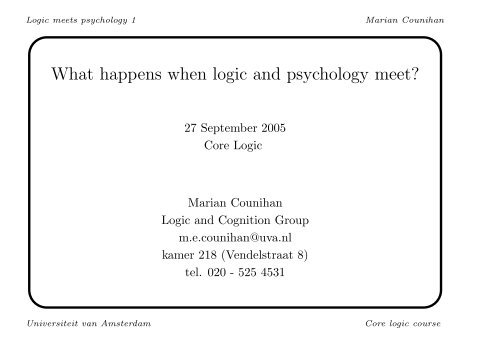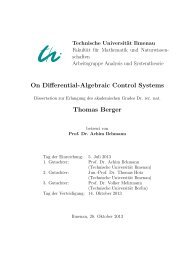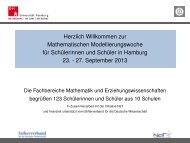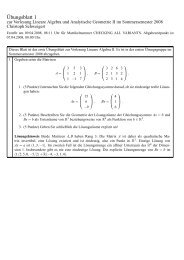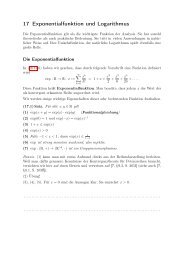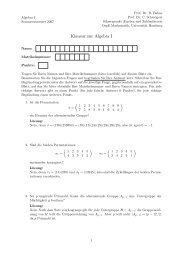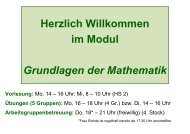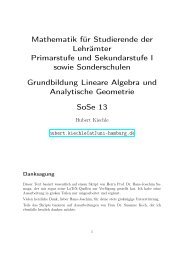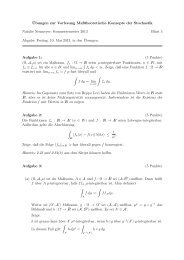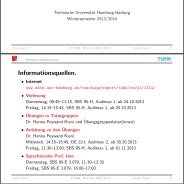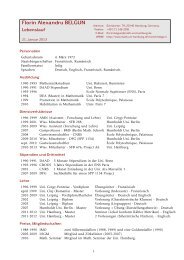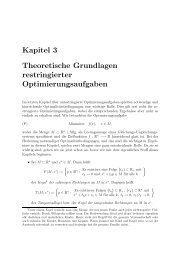What happens when logic and psychology meet?
What happens when logic and psychology meet?
What happens when logic and psychology meet?
You also want an ePaper? Increase the reach of your titles
YUMPU automatically turns print PDFs into web optimized ePapers that Google loves.
Logic <strong>meet</strong>s <strong>psychology</strong> 1<br />
Marian Counihan<br />
<strong>What</strong> <strong>happens</strong> <strong>when</strong> <strong>logic</strong> <strong>and</strong> <strong>psychology</strong> <strong>meet</strong>?<br />
27 September 2005<br />
Core Logic<br />
Marian Counihan<br />
Logic <strong>and</strong> Cognition Group<br />
m.e.counihan@uva.nl<br />
kamer 218 (Vendelstraat 8)<br />
tel. 020 - 525 4531<br />
Universiteit van Amsterdam<br />
Core <strong>logic</strong> course
Logic <strong>meet</strong>s <strong>psychology</strong> 2<br />
Marian Counihan<br />
<strong>What</strong> <strong>happens</strong> <strong>when</strong> <strong>logic</strong> <strong>and</strong> <strong>psychology</strong> <strong>meet</strong>?<br />
Two perspectives on the matter:<br />
- a psychologist’s: the role of <strong>logic</strong> in thinking<br />
cf. idea, from antiquity, that ‘man is the rational animal’<br />
- a philosopher’s: the role of thinking in <strong>logic</strong><br />
cf. origins of <strong>logic</strong> in analysing argument structure<br />
Universiteit van Amsterdam<br />
Core <strong>logic</strong> course
Logic <strong>meet</strong>s <strong>psychology</strong> 3<br />
Marian Counihan<br />
History of the <strong>psychology</strong> of reasoning<br />
Isolated early studies:<br />
• Wilkins (1928), Woodworth <strong>and</strong> Sells (1935)<br />
• Bloom <strong>and</strong> Broder (1950)<br />
• Wason (1968)<br />
. . . <strong>and</strong> then it becomes a bona fide field of study - with attendant<br />
disagreements, controversies, camps<br />
Universiteit van Amsterdam<br />
Core <strong>logic</strong> course
Logic <strong>meet</strong>s <strong>psychology</strong> 4<br />
Marian Counihan<br />
Mental models vs mental <strong>logic</strong><br />
In the mental <strong>logic</strong> corner, we have<br />
• Braine (1978): based on natural deduction for propositional <strong>logic</strong><br />
• Rips (1994): based on natural deduction for predicate <strong>logic</strong><br />
In the mental models corner, we have<br />
• Johnson-Laird (1983): based on model construction<br />
• Byrne (1989): anti-<strong>logic</strong>al nature of model building<br />
Universiteit van Amsterdam<br />
Core <strong>logic</strong> course
Logic <strong>meet</strong>s <strong>psychology</strong> 5<br />
Marian Counihan<br />
Current approaches<br />
• Bounded rationality (Gigerenzer)<br />
• Evolutionary <strong>psychology</strong> (Tooby & Cosmides)<br />
• Bayesian approaches (Oaksford & Chater)<br />
Universiteit van Amsterdam<br />
Core <strong>logic</strong> course
Logic <strong>meet</strong>s <strong>psychology</strong> 6<br />
Marian Counihan<br />
Summary of empirical findings in syllogistic<br />
reasoning<br />
• Validity<br />
- valid syllogisms are easier than invalid ones<br />
• Belief bias<br />
- believability of conclusions interferes with reasoning<br />
• Response bias<br />
- reluctance to answer ‘no valid conclusion’<br />
Universiteit van Amsterdam<br />
Core <strong>logic</strong> course
Logic <strong>meet</strong>s <strong>psychology</strong> 7<br />
Marian Counihan<br />
Empirical findings (contd)<br />
• Atmosphere effect<br />
- a negative premise increases the chance of a negative<br />
conclusion<br />
- a particular premise is more likely to result in a particular<br />
conclusion<br />
• Illicit conversion<br />
- only ‘some’ <strong>and</strong> ‘no’ are symmetric<br />
• Term ordering <strong>and</strong> figure effects<br />
- more likely to order terms one way or other<br />
- AC preferred over CA, unless premises in form BA, CB for<br />
instance<br />
Universiteit van Amsterdam<br />
Core <strong>logic</strong> course
Logic <strong>meet</strong>s <strong>psychology</strong> 8<br />
Marian Counihan<br />
Here’s an example of belief bias at work (Oakhill et al., 1989):<br />
Some of the women are not beautiful<br />
All of the beautiful people are actresses<br />
Some of the women are not actresses<br />
Conclusion believable but invalid yet 46% draw it<br />
vs<br />
Some of the actresses are not beautiful<br />
All of the beautiful people are women<br />
Some of the actresses are not women<br />
Conclusion unbelievable <strong>and</strong> invalid - only 17% draw it.<br />
Universiteit van Amsterdam<br />
Core <strong>logic</strong> course
Logic <strong>meet</strong>s <strong>psychology</strong> 9<br />
Marian Counihan<br />
Here’s an example of belief bias at work (Oakhill et al., 1989):<br />
Some of the women are not beautiful<br />
All of the beautiful people are actresses<br />
Some of the women are not actresses<br />
Conclusion believable but invalid yet 46% draw it<br />
vs<br />
Some of the actresses are not beautiful<br />
All of the beautiful people are women<br />
Some of the actresses are not women<br />
Conclusion unbelievable <strong>and</strong> invalid - only 17% draw it.<br />
Universiteit van Amsterdam<br />
Core <strong>logic</strong> course
Logic <strong>meet</strong>s <strong>psychology</strong> 10<br />
Marian Counihan<br />
<strong>What</strong>’s going on?<br />
St<strong>and</strong>ard argument:<br />
People are sensitive to content as well as form.<br />
Logical inference is based solely on form.<br />
People are not reasoning according to <strong>logic</strong>.<br />
Universiteit van Amsterdam<br />
Core <strong>logic</strong> course
Logic <strong>meet</strong>s <strong>psychology</strong> 11<br />
Marian Counihan<br />
<strong>What</strong>’s really going on?<br />
Hidden equivocations in the st<strong>and</strong>ard argument:<br />
• Grammatical form = <strong>logic</strong>al form<br />
• Natural language connectives = classical <strong>logic</strong> connectives<br />
• Interpretative process in natural language is fixed, as it is in<br />
<strong>logic</strong><br />
These are assumptions we are not entitled to make! We should not<br />
assume natural language sentences can be translated into propositional<br />
or predicate <strong>logic</strong> without losing any of their ‘<strong>logic</strong>al’ properties.<br />
Universiteit van Amsterdam<br />
Core <strong>logic</strong> course
Logic <strong>meet</strong>s <strong>psychology</strong> 12<br />
Marian Counihan<br />
Classical <strong>logic</strong> has been immensely successful. But this<br />
very success has enshrined certain formats <strong>and</strong><br />
procedures, that also have drawbacks. For instance,<br />
many themes suffer from what may be called ‘system<br />
imprisonment’. We have to discuss the behaviour of [say]<br />
negation inside specific formal systems, such as<br />
propositional or predicate <strong>logic</strong> - even though these<br />
systems do not correspond to meaningful distinctions in<br />
the ‘open space’ of actual reasoning.<br />
van Benthem (2000)<br />
Universiteit van Amsterdam<br />
Core <strong>logic</strong> course
Logic <strong>meet</strong>s <strong>psychology</strong> 13<br />
Marian Counihan<br />
Problem: what’s the <strong>logic</strong> of natural language?<br />
Solution:<br />
• Balance judgement with attention to meaning-making processes<br />
• See for e.g.<br />
– material must make sense: Fillenbaum (1978),<br />
– task construal: Stenning & van Lambalgen (2001),<br />
– familiarity with ‘test’ genre: Scribner & Cole (1981)<br />
Universiteit van Amsterdam<br />
Core <strong>logic</strong> course
Logic <strong>meet</strong>s <strong>psychology</strong> 14<br />
Marian Counihan<br />
Meaning making (1)<br />
How do people underst<strong>and</strong> conditionals? (Fillenbaum,1978)<br />
• paraphrasing varies according to meaning:<br />
– contingent universals overwhelmingly get paraphrased as<br />
simple statements<br />
– in contrast to promises, positive <strong>and</strong> negative threats<br />
• but similarities in the inferences admitted: in all cases the<br />
vast majority of subjects said the obverse (‘If not-p, then<br />
not-q’) followed<br />
• observed what he calls pragmatic normalisation, in which<br />
paraphrases change features of the original sentence to make<br />
more sense of it<br />
Universiteit van Amsterdam<br />
Core <strong>logic</strong> course
Logic <strong>meet</strong>s <strong>psychology</strong> 15<br />
Marian Counihan<br />
Meaning making (2)<br />
How do people construe their task?<br />
• Premises as r<strong>and</strong>om sentences or as discourse? (Byrne, 1989 cf.<br />
Stenning <strong>and</strong> van Lambalgen, 2005)<br />
• Logic cued by ‘cheater detection’? (Cosmides, 1989)<br />
• Co-operative or adverserial communication? (Stenning & Cox,<br />
2003)<br />
Universiteit van Amsterdam<br />
Core <strong>logic</strong> course
Logic <strong>meet</strong>s <strong>psychology</strong> 16<br />
Marian Counihan<br />
Meaning making (3)<br />
<strong>What</strong> about the culture of the <strong>psychology</strong> lab?<br />
• Studies with illiterate subjects suggest that reasoning on basis of<br />
given premises is not something done naturally but must be<br />
learnt at school (Scribner & Cole 1981)<br />
• Studies with school-going children indicate that sensitivity to<br />
verbatim/paraphrase distinction develops alongside literacy<br />
skills (Olson, 1994)<br />
• <strong>What</strong> is learnt is not the skill (reasoning <strong>logic</strong>ally) but rather<br />
appropriate contexts for use of the skill.<br />
Universiteit van Amsterdam<br />
Core <strong>logic</strong> course
Logic <strong>meet</strong>s <strong>psychology</strong> 17<br />
Marian Counihan<br />
Genuine cognitive differences<br />
Compare<br />
with:<br />
1. All of the atheists are bankers<br />
All of the bankers are chess players<br />
<strong>What</strong> follows?<br />
2. None of the atheists are bankers<br />
All of the bankers are chess players<br />
<strong>What</strong> follows?<br />
<strong>What</strong>’s the difference?<br />
Universiteit van Amsterdam<br />
Core <strong>logic</strong> course
Logic <strong>meet</strong>s <strong>psychology</strong> 18<br />
Marian Counihan<br />
Where <strong>logic</strong> <strong>and</strong> <strong>psychology</strong> <strong>meet</strong><br />
• there are certainly non-<strong>logic</strong>al factors influencing performance<br />
on <strong>logic</strong>al reasoning tasks, but<br />
• we’re still figuring out exactly where the lines should be drawn -<br />
not all of these factors are the reasoner’s responsibility<br />
• <strong>and</strong> maybe empirical results can tell us about the <strong>logic</strong> of<br />
natural languages.<br />
Universiteit van Amsterdam<br />
Core <strong>logic</strong> course


